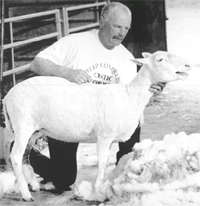Dying very young
 it seems , for now that is, all the frantic debates on the implications of human cloning were not really necessary. The last few months have not been very pleasant for cloning scientists.
it seems , for now that is, all the frantic debates on the implications of human cloning were not really necessary. The last few months have not been very pleasant for cloning scientists.
In December, researchers at the Kinki University, Japan, cloned eight genetically-identical cows from only 10 implanted embryos. Four of them died within a few days of birth. Researchers at the Oregon Regional Primate Research Center in Beaverton, usa , have tried hundreds of times (135 times to be precise) to clone a single monkey. But they are not giving up hope as yet.
These events give scientists and researchers involved in cloning more than one reason to worry. As it is they have been unable to explain the high fatality rate of cloned animals. Also, the unsuccessful attempts of cloning monkeys has led to a nagging question: will it be easy to clone humans as was earlier believed?
Ever since experiments in cloning began, for every cow or sheep clones that survived, an equal number died either in late pregnancy or soon after birth. Cloned mice is perhaps the only exception, but even here researchers say unhealthy embryos may be reabsorbed, which could be hiding the problem.
However, Yokio Tsunoda and Yoko Kato, the Japanese researchers who produced the four cloned calves, say that their experiment was successful. While attributing the survival of the four calves to a combination of techniques or their dexterity, they are blame the death of the other four to "environmental causes'. Speaking to the British journal New Scientist, Tsunoda said: "Two calves breathed in large amounts of amniotic fluid during birth, one died of pneumonia and the fourth died from complications during delivery.' Even Dolly, the world's first cloned animal, was the only survivor from 29 implanted embryos, he says. The technique they used was similar to the one used by the Scottish team that produced Dolly. They starved the donor cell into a state of genetic hibernation and used an electric jolt to fuse it with an egg from which the genetic material had been removed.
Some experts like Jean-Paul Renard who is with a French agricultural agency attribute this for producing "weak' animals. He cloned a calf from a fetal muscle cell which died when it was six weeks old due to an infection. "We are looking for evidence that cloning is related to these effects. You get beautiful calves. But some might turn out to be a lot weaker than others,' he says. Some feel that the death rate will decrease as scientists improve their skills. George Seidel, a reproductive physiologist at Colorado State University, usa , says that the deaths might be due to immune, cardiovascular and other complications.
Researchers attach immense importance to the cloning of monkeys. "Cloning monkeys will be one step towards cloning humans,' said one scientist. This is because monkeys are more closely related to humans than are sheep, mice and cattle. But the science of reproductive manipulation is more advanced for monkeys and humans than for other animals. "Clearly it is not easy in monkeys, so it is going to be tougher for humans,' said James Thomson, an embryologist at the University of Wisconsin, usa . It will take time to establish the real reason for the premature deaths of cloned animals. And it will take even more time and research to clone monkeys before humans can follow.
Related Content
- Delhi tops the country in fatal road accidents and in number of pedestrians and cyclists falling victim, says new CSE assessment
- Monthly Overview on State of Environment, Bangladesh, December 2013
- ‘Learning through Serving transforms Children into Change Agents’, says Menahem Kanafi, Israel Consul General to South-India
- Going high on smoke
- Himachal villagers resist pine monoculture, reclaim forests for fodder
- Forests are the main source of herbs
